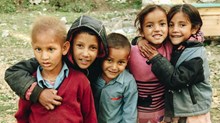Want to Help Refugees but You’re Not Sure Where to Start? Try Friendship.

Growing up in Pakistan, I observed many Afghan men and young boys in my neighborhood with torn clothes, bare feet and bags on their backs. They could be found in piles of garbage, collecting glass, plastic, metal, and food, through the oppressive heat of summer to the bitter cold of winter. Some called them garbage collectors, while others referred to them as “panah-guzin”, a Persian/Urdu word meaning seeker of protection or refugee. As foreigners, these Afghan refugees are often mistreated, neglected, despised, and taken advantage of.
There are approximately 26 million refugees around the world living in similar circumstances and the number of refugees grows annually. The term refugee is used to describe a person who has fled their own country due to well-founded fear of persecution and serious human rights violations. The Afghans, Rohingya, Uyghur, Congolese, South Sudanese, Somalis, Syrians, and Iraqis are among the largest groups being forced to live as refugees. Many who arrive in the U.S. are Christians.
Often, we feel gratified by aiding monetarily to a refugee cause or an organization that assists the refugees. Financial contributions are valuable; however, there are other extremely valued forms of assistance. For example, engaging with a refugee at a personal level, having a welcoming and caring heart for the vulnerable in our society. Like everyone else, the refugees need friends, and they long to develop relationships. Some Christians are hesitant and choose not to go this path.
The process of acculturation and adaptation can be exceedingly traumatic and challenging. The life of a refugee produces immense pressures that can often lead to experiences of exclusion, isolation, serious psychological and emotional stress. The Christian church can step forward, demonstrating Christ-like love, to make this social and cultural inclusion more attainable for the refugee communities. As Christians, our mandate is to do good to all people, especially believers (Galatians 6:10). Throughout the Scripture, the people of God were strongly instructed to treat the gērîm (strangers and foreigners) with great care, because they were once strangers and foreigners in Egypt. For this very reason, Moses named his first son Gershom (a sojourner) because he was a foreigner in a strange land (Exodus 2:22). Christians are called not only to be a light of the world, as Dr. Stetzer states, but to love the most vulnerable and the brokenhearted.
By reminding ourselves that we are strangers on earth, passing through this life and awaiting our permanent citizenship in heaven, we can acquire meaningful perspectives concerning the refugees amongst us (Hebrews 11:13-16). The caring actions of the Good Samaritan demonstrate the power of viewing others as people made in the image of God. The greatest commandment has two parts—love God and love your neighbor—but many choose to view them as being detached from one another. John addresses this dangerous perspective, saying that one cannot love God whom he has not seen if does not love his brother whom he sees (1 John 4:20).
Christians must find the courage to turn to the Scriptures for an informed understanding of what it means to meet the needs of the most vulnerable effectively and compassionately. A vast majority of churches fail to address the challenges revolving around refugees. If our churches can be intentional in caring for refugees, it will not only make a difference in the daily lives of refugees among us, but refugees can greatly enrich Christians through their presence as well. The absence of motivation and commitment can lead to the deprivation from receiving this two-fold blessing.
I personally know Christian brothers and sisters who, through the working of the Spirit of God in their lives, entered the lives of refugees in America. They fed them. They clothed them. They housed them. They helped them find employment. They were there during the birth of their children. They invited them over to their family events. Quite simply, they demonstrated the love of Christ by being with refugee families during the daily and the monumental struggles of life. Through it all, these “helpers of God” realized what is common in ministry, they were blessed in return.
Starting the conversation can be awkward and daunting. However, just having a “listening ear” can be like a drop of water in the desert to a refugee, while the listener will be richer for the experience of learning about other people and cultures. On this World Refugee Day, let us express a genuine concern for the foreigners in our midst. In taking care of the refugees, let us be guided by faith and not by fear.
Yousaf Sadiq (PhD, London School of Theology) from Pakistan, is passionate to be a voice for the persecuted church. He is a visiting assistant professor at Wheaton College, and author of The Contextualized Psalms (Punjabi Zabur): A Precious Heritage of the Global Punjabi Christian Community (Wipf and Stock Publishers, 2020).
The Better Samaritan is a part of CT's
Blog Forum. Support the work of CT.
Subscribe and get one year free.
The views of the blogger do not necessarily reflect those of Christianity Today.






















